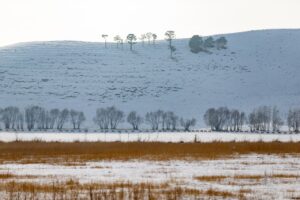Farmers in Helmand province, located in southern Afghanistan, have expressed that following the Islamic Emirate’s ban on opium poppy cultivation, they have turned to horticulture, particularly the establishment of date palm orchards.
Din Mohammad, a farmer in Helmand, says that in recent years he has focused on growing date palms. He adds that this fruit yields a better income than opium poppy. “Creating date orchards is very beneficial; if we have our own orchards here, we won’t need dates from other countries. Dates provide a long-term, sustainable source of income, something that was never possible with opium poppy.”
Sharafuddin, another farmer in Helmand, mentions that through his date orchard, he has been able to meet part of his family’s needs. “Date orchards are excellent; people consume a lot of dates, and this provides us with a new economic source. The government should provide more saplings to farmers,” he said.
These farmers call on the Helmand Directorate of Agriculture to assist in offering alternative crops, especially by distributing date palm trees.
Mohammad Nasim Muslim, Director of Extension at the Helmand Directorate of Agriculture, says that in efforts to expand date farming, dozens of date saplings have been purchased and planted. “Last year, we established 10 date orchards in various parts of Helmand, which will bear fruit in three years. Currently, the date trees are in good condition, and we are hopeful for a positive outcome.”
Abdul Wali Wafa, an agricultural expert based in Helmand, states that the de-facto government of the Islamic Emirate should support farmers in adopting alternative crops to replace poppy cultivation.
“Those who have planted date orchards in recent years have made significant profits. Dates not only have high demand in the local market but also offer a good opportunity for export to other countries,” he explained.
Helmand’s climate is favorable for growing date palms, and the dates produced in the province are of high quality. Experts believe that with proper attention, this could fulfill domestic needs and boost local agriculture.






